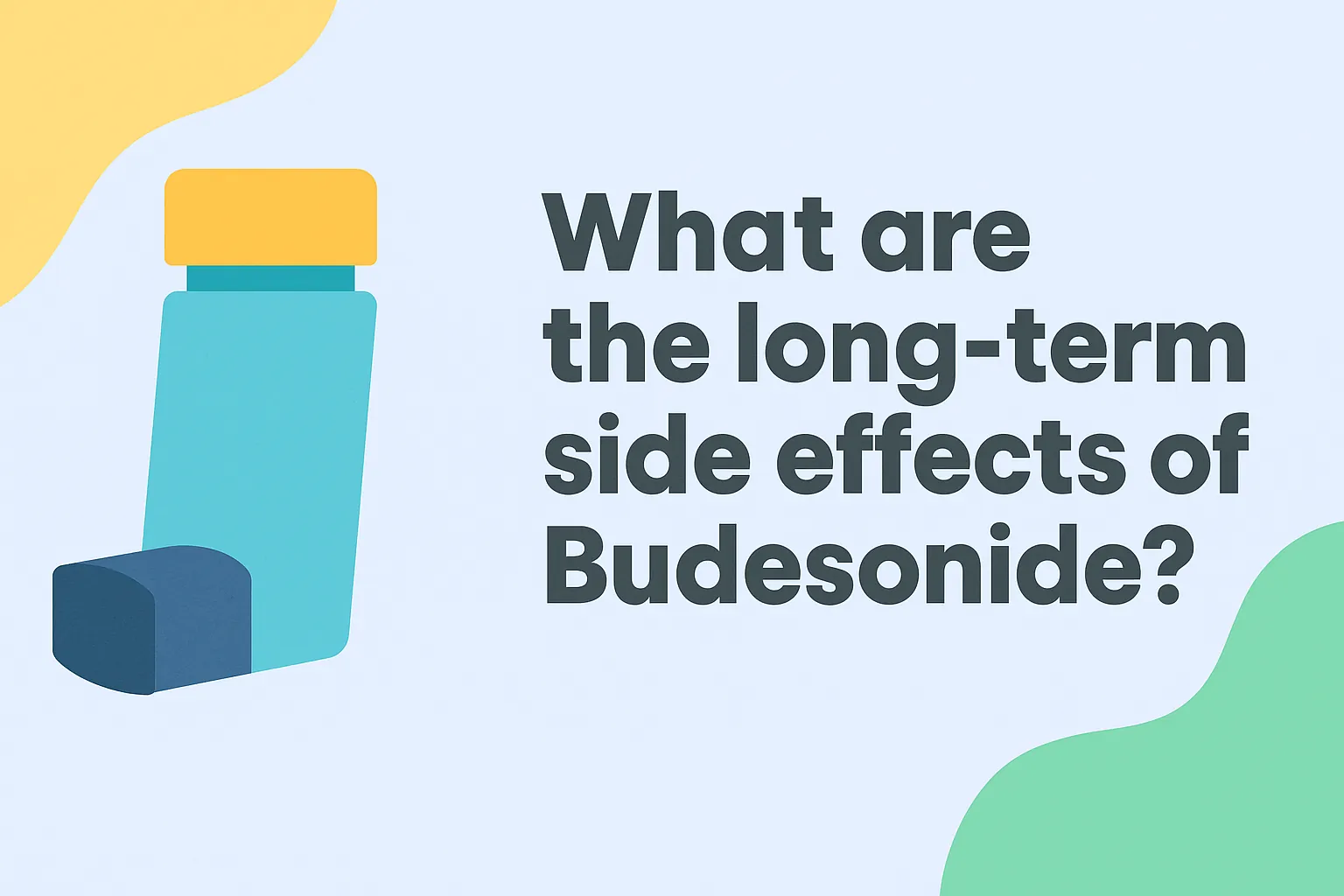What are the long-term side effects of Budesonide?

Budesonide is a generic prescription steroid medication used in extended‑release or delayed‑release pills for Crohn’s disease or ulcerative colitis, as rectal foam for ulcerative colitis near the anus, inhaled for asthma and COPD management, and as a nasal spray for allergic rhinitis and nasal polyps. It is generally well tolerated, but like all medications, it can cause side effects.
Common side effects of oral budesonide (capsules or tablets)
- Headache
- Respiratory infection
- Nausea
- Back pain
- Joint pain
- Dizziness
- Upset stomach or indigestion
- Gas
- Stomach pain
- Vomiting
- Tiredness
- Mood changes
Common side effects of inhaled budesonide
Inhaled corticosteroids like budesonide are absorbed in the lungs and tend to have fewer systemic side effects than oral forms. Common effects include:
- Cold symptoms (stuffy or runny nose, sore throat, cough)
- Viral upper respiratory tract infection
- Nausea
- Stomach virus
- Oral thrush
Common side effects of budesonide nasal spray
- Nosebleeds
- Sore throat
- Coughing
Common side effects of budesonide rectal foam
- Drop in cortisol levels
- Nausea
- Adrenal insufficiency
Serious, long-term side effects
- Severe allergic reaction: hives, swelling of face/tongue/throat, shortness of breath — seek immediate medical attention.
- Changes in stress hormones: long‑term or high‑dose use mimics excess cortisol (weight gain, “moon face”, upper back swelling, limb fat loss); abrupt discontinuation may cause low‑cortisol symptoms (nausea, loss of appetite, weakness, diarrhea).
- Vision changes: increased eye pressure, worsening glaucoma, cataracts — report blurry vision or eye discomfort immediately.
- Increased infection risk: weakened immune system may raise risk of fungal, bacterial, or viral infections; avoid sick contacts and seek care for fever, chills, cough, or breathing difficulty.
- Worsening of other conditions: may exacerbate diabetes (high blood sugar), high blood pressure, osteoporosis, glaucoma, cataracts, and stomach ulcers; close monitoring may be needed.
- Delayed growth in children: use the lowest effective dose for the shortest duration; discuss growth concerns with a healthcare provider.
These are not all possible side effects. Contact your healthcare provider for medical advice about any adverse effects you experience. Read the Medication Guide each time you fill this prescription. Report side effects to the FDA at 1‑800‑FDA‑1088 or www.fda.gov/medwatch.
How does budesonide work?
Budesonide is a corticosteroid that lowers inflammation and swelling in different parts of the body depending on its dosage form, making it effective for various inflammatory conditions.
What is budesonide used for?
- Asthma
- Chronic obstructive pulmonary disease (COPD)
- Inflammatory bowel diseases (Crohn’s disease, ulcerative colitis, microscopic colitis)
- Primary immunoglobulin A nephropathy
- Nasal polyps
- Hay fever and allergies
Drug interactions
Using budesonide with other medications, vitamins, or supplements may alter their effects or increase side effects. Inform your healthcare provider about all you take, including:
- Antacids
- HIV/hepatitis protease inhibitors
- Erythromycin, clarithromycin
- Ketoconazole, itraconazole
- Cyclosporine
- Cimetidine
- Grapefruit juice
This list may not include all possible interactions.
Warnings and precautions
Do not take budesonide if you are allergic to it or any inactive ingredients. Inhalation powder contains milk proteins—avoid if allergic. Inhalers should not be used during an asthma attack; keep a short‑acting inhaler available.
Tell your healthcare provider if you have:
- Diabetes
- Active infection or tuberculosis exposure
- History of chicken pox or measles exposure
- Stomach ulcers
- Liver disease
- Vision problems (glaucoma, cataracts)
- Osteoporosis
- High blood pressure
- Adrenal insufficiency
- Planned surgery
- Pregnancy or planning pregnancy
- Breastfeeding or planning to breastfeed
Does budesonide cause weight gain?
Many corticosteroids, including budesonide, can cause weight gain. The likelihood increases with higher doses and longer use. Seek medical advice if you notice unusual weight gain.
How long is it safe to be on budesonide?
Depending on your condition and tolerance, you may remain on budesonide long-term as deemed necessary by your healthcare provider. Attend regular follow-up appointments to assess ongoing need.
How quickly do side effects start?
Common side effects like headache, dizziness, digestive issues, and mood changes often start soon after treatment begins. Serious side effects typically occur after prolonged use, although allergic reactions can occur within minutes of the first dose.
Related Medications
- Entocort EC (budesonide)
- Entocort Enema (budesonide)
- Pulmicort Flexihaler (budesonide)
- Rhinocort AQ Nasal Spray (budesonide)
- Pulmicort Respules (budesonide)
- Uceris (budesonide)
- Tarpeyo (budesonide)
Sources
- Budesonide inhaled (Rx). Medscape. Accessed July 16, 2024.
- Budesonide rectal (Rx). Medscape. Accessed July 16, 2024.
- Budesonide intranasal (Rx, OTC). Medscape. Accessed July 16, 2024.
- Budesonide (Rx). Medscape. Accessed July 16, 2024.





